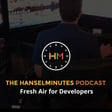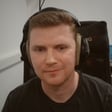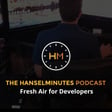Become a Creator today!Start creating today - Share your story with the world!
Start for free
00:00:00
00:00:01

Why Postgres? and why now? with Claire Giordano
Postgres has quietly become the world’s favorite database...running startups, governments, and global clouds alike. Scott talks with Claire Giordano, long-time Postgres advocate and technologist, about the database’s unlikely rise from academic roots to modern dominance. They explore its design philosophy, the open-source community that fuels it, and why Postgres keeps winning even in the age of AI and hyperscale data.
https://www.postgresql.org/
This episode is sponsored by Tuple and Postman
Check out https://tuple.app/hanselminutes for the best remote pair programming app on macOS and Windows
Check out https://postman.com/hanselminutes for powerful API development and testing
Transcript
Intro & Sponsor Highlight
00:00:01
Speaker
Hey, friends, it's Scott. I'm going to take a moment in the middle of the show here and thank our new sponsor, Tuple.
Benefits of Pair Programming
00:00:06
Speaker
and I'm chatting with Johnny Marler. You know, Johnny, pair programming is kind of a niche thing, right? Like, I know a lot of devs that don't pair much at all. Do you really think it's worth pair programming?
00:00:17
Speaker
Yeah, I think even if you're the best programmer in the world, there's always something you can learn from other people. And, ah you know, I think there's nothing like pairing that enables you to exchange like really technical expertise.
00:00:32
Speaker
um You know, for example, I'm really systems oriented, I have exhaustive air handling. I wrote my own X11 library because the error handling wasn't good enough. And my coworker, Mikey, he's he's completely different. he's He's really an expert on Mac OS. He's a big Objective-C fan.
00:00:49
Speaker
um But because we've paired so much, we've slowly been able to build up um expertise in each other's domains and styles. And he's taken some stuff from me and vice versa. um It's been really good to have that regular pairing and exchange of ideas and information.
00:01:06
Speaker
So I think it's really hard to get that. And it's also hard to stay on the same page when you're not pairing with somebody. it's Instead of you know trying to send comments to each other in a GitHub pull request and maybe arguing over something, being able to slow down and take that time and work on something real with somebody, there's just nothing that replaces it.
00:01:25
Speaker
Very cool. I think more people should try pairing. I did a lot of pairing in person and the nearest thing you can do from pairing in person is using something like Tuple. You can check it out at tuple.app. It's the best remote pair programming app on both Mac OS and Windows.
Embracing Open Source at Microsoft
00:01:41
Speaker
Hey friends, I'm Scott Hanselman. It's another episode of Hanselman. And today I'm chatting with Claire Giordano. How are you? ah good. Super excited to be here. I'm glad. I'm glad you work on Postgres, an open source database, and you do this for Microsoft. And it's unusual, of course, that you're working at open source at Microsoft. I people when I tell them I'm working on open source at Microsoft, they're kind of shocked and surprised.
00:02:05
Speaker
How long have you been in the Postgres community? Since 2017. Okay. that's So it's been a minute. it'll be It'll be like 10 years at some point. But Postgres, am am i am I saying it correctly? Because I've heard Postgres SQL, PostgresQL.
00:02:22
Speaker
What's the right way to say this? Just say Postgres and that keeps it simple. But yes, when you when you spell it with the full official name, there is a there is a QL tagged on to the very end of it.
00:02:33
Speaker
Okay. So Postgres is the way to do it. Postgres has been around since 1986. When did you discover Postgres?
Postgres Design & Popularity
00:02:41
Speaker
I discovered Postgres when I first joined the Citus open source team, ah which was a small San Francisco based startup in 2017.
00:02:50
Speaker
And Citus is an extension to Postgres. So that's kind of how I got, how I got my start. And, uh, In the beginning, I was focused almost completely on the Citus extension.
00:03:02
Speaker
And then over time, after Microsoft acquired the company, I became more and more involved with the Postgres core. And that's what i spend my my days on now. So Citus was an extension, an open source extension to Postgres that made it more distributed, right? It made it basically allowed you to scale it out horizontally.
00:03:23
Speaker
But it's not a fork. It's not a copy or a fork of Postgres. It was literally done as an extension, which I think is surprising. Well, one of the things that i came to learn is that in the very first design document authored by Michael Stonebraker and Lawrence Rowe back in like the 1986 timeframe called the design of Postgres, the second design objective on there was the extensibility of Postgres in terms of data types and access methods and things like that. And so what I think is so cool is that part of what has made this ecosystem so big and has made the database so popular with developers is the extensibility.
00:04:03
Speaker
And it's just, I don't know, it was a very smart design decision back in Yeah, it truly was. I grew up doing doing ah SQL Server and there's this theory. Someone told me that you can tell if you're like a secret Microsofty because Microsofty say SQL and open source people say SQL. Is that true?
00:04:24
Speaker
I don't know if that's true. I have heard everything pronounced six ways to Sunday. In fact, I even made a like a one minute video skit at one point, making fun of all the different ways to spell and pronounce Postgres.
00:04:38
Speaker
So there's a famous email that was sent probably in the 2006, 2007 timeframe from Tom Lane, who's a very famous Postgres contributor and committer and engineer.
00:04:51
Speaker
Where he basically you talked about how maybe one of the worst decisions of the Postgres project was the name of it.
Strengths of Postgres
00:04:57
Speaker
Because it it does get mispronounced and it does easily get misspelled.
00:05:01
Speaker
But it's too late to change it now. I think every good successful open source project has to have confusion about how to do the name, whether it be and Nginx or Kubernetes or whatever. There was an old...
00:05:12
Speaker
meme where someone pronounced Kubernetes as cyber noodles and they just basically gave up in the early days. have not heard that one. Yeah. So I was doing...
00:05:24
Speaker
Microsoft SQL Server back in the early 90s, like on and on Windows NT and Postgres. I don't think I even heard about Postgres until about 10 years ago when I started studying, though.
00:05:37
Speaker
This is a 40 year old project, but somehow there's a freshness to it. That surprises me. do Is that what do you think makes it feel fresh right now? That is a really hard question to answer.
00:05:51
Speaker
i was at a conference last week i'm in Latvia of all places. It's the annual European Postgres conference that moves around to different countries and cities every year. And I was walking the hallway and talking to people you because I knew I was going to be on the show, right? I wanted to not just represent what Claire thinks, but, you know, ah harness the ideas and perspectives of others.
00:06:14
Speaker
And um I was asking them this question about why, why is it so popular? And of course I got a lot of different answers. So there's, there's, I think there are many reasons, just like if you ever study a car accident, this is changing something positive to something negative.
00:06:32
Speaker
There's often multiple factors that lead up to the accident. And so in many ways, this is a happy accident that Postgres is in such a good place, but there are, there are different factors.
00:06:43
Speaker
Um, I, you know, where do where do you want to start? Well, I was thinking when I think about open source SQL, I think about Postgres, I think about MySQL or MySQL, and I think about SQLite.
00:06:56
Speaker
But Postgres is the first among equals. It's so much more. It's more standards compliant. It's got better scalability. Like with all due respect to the MySQLs and the SQLites, they almost feel like toys compared to Postgres. So I feel like Postgres is one of the like slow and steady wins the race. Like just grind it out, focus on standards compliance, focus on really good quality enterprise use cases.
00:07:19
Speaker
And then it is an overnight success in 40 years. That's my theory. It's a good theory and it works. Let's add to it. Let's let's pile on some some other aspects. Obviously, Postgres is open source.
00:07:33
Speaker
and So people know that. And it has a very permissive license, which means it's okay to fork it. It's okay to pretty much do anything. The license is called the PostgresQL license, but can think of it as similar to MIT or similar to BST, just very liberal in terms of what you can do. And As a result, it means a lot of universities use it A lot of people learn it in college.
00:07:58
Speaker
It's very easy to get started with it and kick the tires as a developer. And so I think the openness of it has definitely contributed to the the expertise that people have when they're interested in data and when they're interested in analyzing data.
00:08:16
Speaker
What else? You know, it helps. It helps that Postgres doesn't belong to any one company. That was next question. i was like, what's the giant company that owns it? Yeah, there is no giant company.
00:08:27
Speaker
Microsoft has a whole bunch of people on salary who work on the upstream Postgres open source project. you know In addition, we we have our Azure database for Postgres offering that we that's a managed service that customers use. but But people like me and the developers who work on it, you know we're focused on the open source project.
00:08:47
Speaker
But we're not the only company, right? EDB, Amazon, um a lot of smaller companies, even Google have people who contribute to this project. And the collaboration is global.
00:08:59
Speaker
It's across so many different countries. And continents. And there's a lot of commercial interests involved, but no one single company behind it. Some people call it sometimes the people's database because of that fact that the interests in it are so, so distributed. That makes me feel like its success is the fact that it never got purchased.
00:09:23
Speaker
Well, it certainly never got, it never got bought by Oracle. And, and so nobody wants that. Nobody wants that. It's also was helpful. I was looking up the years. Let me, let me go find them.
00:09:35
Speaker
Heroku went all in on a Postgres offering as a managed service back in 2007. And then Amazon launched RDS Postgres, which is the managed service for Postgres in 2013.
00:09:47
Speaker
twenty thirteen Azure came out with our managed Postgres offering in 2017. But if you go back to kind of Heroku and Amazon, za they they were almost like trendsetters in this space. and they They really commercialized access to people who wanted the managed service experience with it and helped to make it popular too.
Community-Driven Development
00:10:12
Speaker
Yeah, and made it and made it cloud scale because I know that like in that early 2000s, making Postgres enterprise ready and doing things like performance and table spaces and point in time recovery. These were all things that were like important checkboxes in order to make sure that this was going to be a real alternative to an Oracle or to an SQL server.
00:10:34
Speaker
And then if you go back to the 90s, I don't know if it was the early 2000s or the late 90s, but when Oracle came out with their multi-core licensing, right that that definitely made Oracle more expensive, which did prod some people to want to look for some relational database that was more affordable, um but still could meet all the requirements.
00:10:57
Speaker
And then you said web scale that brings up the idea of no sequel. Right. And that wonderful cartoon that came out years ago. Um, but, Postgres added support for JSON and JSONB too along the way. I think that was like 2012. And that, I think, was also a watershed moment in helping popularize post Postgres because it meant you could have this ability to create schemas that were more flexible um in addition to having all of the benefits of relational.
00:11:29
Speaker
And you could do that in one database. Wow. um and And JSON support was added first and then JSONB, right? The binary object notation support came in probably a couple of releases later.
00:11:39
Speaker
and So there were all these different watershed moments that kind of added together and the community just got stronger and stronger. Yeah. And but those little features are the ones like Jason showed up just when we needed it. Right. And cloud scale showed up just when we needed it. So it was, it was there quietly improving itself and then it was ready to go.
00:12:01
Speaker
By the way, i did a little bit of research. You probably know this, but tell me if you do or not. So Michael Stonebreaker, who is now in his early eighties is the computer scientist that worked on a database that was called ingress.
00:12:16
Speaker
interactive graphics and retrieval system in 1973. yeah Postgres is literally their post-ingress project. Correct.
00:12:27
Speaker
that's That's so funny. There's always a recursive acronym behind every great open source project. There's always some 50-year-old story about what it stands for, and now we've all forgotten it, and we just say Postgres and smoosh it all together.
00:12:44
Speaker
And then about 10 years later, after it it had been called Postgres for 10 years, ah SQL support was added and there was a decision to change the name to add, you know, to have it be PostgresQL. Yeah.
00:12:59
Speaker
And which was a good decision in many ways, but has led to all sorts of mispronunciation and misspellings and other challenges. So, and what was the joke you were telling me that has been told a million times before, right before we started the recording, there's two classic problems in computer science and the first is naming, right?
00:13:20
Speaker
yeah And the other ones are, i think, scale and off by one errors. Exactly. There we go. do Yeah. Yeah. don't do Hey friends, this is Scott. I want to take a moment and thank our new sponsor Postman.
00:13:34
Speaker
You know, when i think about APIs, I think about Postman. I was chatting with Roderick about how he's leveraging APIs to build agents. What benefits have you seen in building agents? Thanks, Scott. We've seen a lot of internal benefits. We've been actually prototyping and deploying into production agents built with Postman flows inside of Postman across functions. A lot of them are developer or operations oriented, things that help us, for example, summarize our Slack conversations into GR tickets or that automate our on-call processes.
00:14:06
Speaker
But also in our marketing team, and our sales team, our customer service teams have all deployed agents that help them cut down on a lot of chores and manual tasks that they do.
00:14:16
Speaker
The transformative power really comes from being able to connect an API that's AI ready to AI. And Postman is a great place to do that. We have 100,000 plus APIs on the Postman API network, ah thousands of potentially ready to use APIs that you can compose into your agents right off the bat.
00:14:36
Speaker
And the transformative power of agents is they do the work for you. You don't have to sit there and do all the things manually and check them. They can just go off, ask you when they need input, but otherwise they accomplish tasks and warp time.
00:14:48
Speaker
It just increases your efficiency overall.
APIs & Operational Efficiency
00:14:51
Speaker
AI agents are supposed to do the toil and the work that's not fun so that you can do the fun stuff. Postman flows, lets you orchestrate APIs, logic data visually to make those agents. And you can learn more at postman.com slash Hansel minutes.
00:15:06
Speaker
So we we have we're in the mid-2000s. We're developing a product that is open source. It's owned by no one. It is based on good, solid computer science. It's also based on standards.
00:15:20
Speaker
It seems like there's a very much a focus of, like, whatever we're doing, we're going to make sure that we're very close to the full SQL standard, and we have compliance. you know MySQL, SQLite, other databases have...
00:15:34
Speaker
partial and basic compliance. And then also, like you said, a friendly license, but Postgres is also known for its its welcoming community. And that's probably not something that they built in in the seventies and eighties. Like when, was it welcoming when you got there or was that, is that a conscious thing to always make sure that the Postgres community has chill vibes? Yeah.
00:15:55
Speaker
So I can't speak to before I got there, but I can say that when I arrived on scene in 2017 and later, it is a very welcoming community. Last week, there were probably 680 of us in Latvia, many of whom are users who travel from other parts of Europe or other parts of the world to come and learn more about ah the latest capabilities of the release, but many of whom were contributors and community members who were also in the hallways, you know, thick talking about the next release and, you know, trying to solve problems and figure out how to collaborate.
00:16:30
Speaker
And I, I have personally always found it welcoming and those who I know bend over backwards to try to figure out how do we, you know, grow, grow new contributors, grow new community members, if you will.
00:16:46
Speaker
um And, um, how How we do that, I don't know. I mean, there's code of conducts, obviously, that people take very seriously at these in-person conferences.
00:16:57
Speaker
There's also a lot of transparency in the open source projects. So we we use something that's a little bit old school, which are mailing lists. And there's a lot of collaboration that happens on the Postgres
Postgres Development Process
00:17:08
Speaker
mailing list. And if you're listening to the show, you can go read what the committers and the contributors are saying to each other.
00:17:15
Speaker
So it's not on Discord. It's not in Slack. It's not on... Well, there is a Postgres Slack. It has 24,000 members, many of whom most of whom are users and who are asking you know technical questions, similar to on Stack Overflow, where there's a lot of Q&A about the project.
00:17:32
Speaker
There is a Postgres hackers Discord that was created last year to support a mentoring program that was instantiated last year for up-and-coming contributors,
00:17:44
Speaker
But yes, the majority of conversation, particularly amongst the hackers community, and I don't mean hackers in terms of like these security. We use the term hackers in Postgres to mean Postgres developers who work on the database.
00:18:01
Speaker
As distinguished from Postgres developers who are like application developers who run on the database. So, you know, there's different levels or focus areas for developers. Anyway, it's, there's...
00:18:14
Speaker
But the the the decisions, it sounds like, make happen, the governance, the consensus-driven community is happening really on those mailing lists. Yes. Yes. and And one other thing that distinguishes Postgres from other databases that might have a single company behind them is there is no top-down roadmap that gets created and for each new release, for example.
00:18:36
Speaker
It's all very bottoms up. And people work on ah what they think is important based on their interactions with users, based on what they're learning online, and and also based on ah what they can convince other people to collaborate with them on.
00:18:52
Speaker
There's this annual conference that happens in Canada every year. It's it's now called PG Conf Dev, and it'll happen again next May. It'll be Vancouver this time. And a lot of the committers and contributors go to that event, and that's where the collaboration starts for the next release.
00:19:08
Speaker
So if someone were to have an idea, they would go into the mailing list, they'd express their idea, and the idea would make its way all the way to a major version over some period of time based entirely on the strength of that idea.
00:19:20
Speaker
They would not be able to push that through and get it all the way out if everyone was not excited about that new feature. Yeah, you basically, you don't have to convince everyone to get something in, and but you have to convince enough people.
00:19:33
Speaker
And we there are 31 committers in the Postgres project today. That number will probably change again next spring when new new people are invited to become committers.
00:19:44
Speaker
and But committers are people who have that commit bit, who are actually, and a lot of other open source projects, they might be called maintainers. So certainly if you're authoring some new update to the code, ah you do have to find a committer who's willing to commit it. And, you know, that's a big commitment on their part. Sorry for the pun.
00:20:05
Speaker
Because, you know, once it's in, the committer oftentimes has to be the one to deal with any possible reverts or updates or immediate fixes or or whatever. And, you know, often those aren't needed, but sometimes they are.
00:20:17
Speaker
And so they're they're signing up to to be partnered with you. um to maintain it moving forward. That's pretty cool. And it must be interesting to manage the the desires of communities versus the desire of the companies that pay the salaries.
00:20:35
Speaker
Like you're a Postgres team member, but you also work at Microsoft and there might be an Amazon person who like their boss might say, hey, go and try to get that into Postgres. They've still got to convince the community. and Otherwise it's an extension or it's an add-on.
00:20:49
Speaker
And you would not want to destabilize the the ah product. and And Postgres, if I may, has kind of a reputation for being somewhat conservative in adding new features. They're they're not going to add something if they don't think it's going to be helpful and and everyone's going to appreciate it.
00:21:03
Speaker
One of the exciting new things that has just been added to Postgres 18, which might not sound new to you if you're coming from another another database or another project, but asynchronous I.O. support for reads has just been added to Postgres 18.
00:21:19
Speaker
And that's been years in the making. In fact, ah I'm excited to be here on your podcast, but I host a monthly podcast as well called Talking Postgres, a little minor plug there. And recently I had Andres Freund on as a guest and it was it was really cool. It
Trademark Protection & Usage
00:21:35
Speaker
wasn't about asynchronous I.O., like here's how you use it or here are the capabilities that that new feature gives you.
00:21:42
Speaker
But it was instead, Andres, by the way, is committer and a partner engineer who works at Microsoft, ah but he's also... ah works in the open source project first and foremost and is member of the core team.
00:21:54
Speaker
And he was reflecting on what went wrong and what went right with that project it because it was a multiple, it was a five-year-long project leading up to this point in Postgres 18. Wow, five years.
00:22:08
Speaker
Yeah. With, you know, peaks and valleys and ups and downs and um and also like a number of contributions into the previous releases that planted the seeds so that this this could go live in Postgres 18. That's a great point. I don't think people realize that in order to do a big thing, you have to lay the groundwork.
00:22:26
Speaker
Like i know like we're on.NET 10 right now and there are things that were put in.NET 6 and 7 that are getting ready to support features coming in.NET but ten So his, you know, the the team's master plan to get async ah five years ago and putting features in and making sure that they're stable and and getting them ready for Postgres 18, I'm sure was a very long, long process.
00:22:48
Speaker
Well, and that part of being an architect is one that I feel like nobody nobody teaches you when you're younger, right? When you're a junior engineer. but But it's a really important part to figure out how to carve things up and and lay them out. And also, you can't you can't put things into a release that don't get used.
00:23:06
Speaker
There has to be a user for those new capabilities. And so, yeah, it was very exciting. Yeah. I have looked around to see if there was any drama because sometimes communities and open source communities have drama.
00:23:20
Speaker
And the only real drama that I could find within Postgres was someone tried to trademark Postgres and the PostgresQL core team like pushed back on that and was like, no, you can't
Postgres in Azure
00:23:32
Speaker
do that. That that was a sloppy and foolish thing to do. Did you, do you remember that? That was a couple years ago.
00:23:37
Speaker
I do remember that. And I probably know more about that than I should because about a year and a half ago, I became a board member for this entity called PGCA, Postgres Community Association. And we we shepherd the trademarks for Postgres. So that's the names, Postgres and PostgresQL, both of them, both spellings, as well as Slonic, which is the elephant logo or icon, if you will, that is that you know visually the communicates that this is Postgres.
00:24:09
Speaker
So we we protect the trademarks and domain names for all of those things. And part of what I've been trying to do, and I did not plant this seed with Scott, just so you know, i don't even think he knew that I'm a board member. No, I didn't. know I'm learning this now. I was just doing research. I've got about 48 tabs open right now.
00:24:26
Speaker
So one of the things though, that as a board member now that I try to do is raise people's awareness that there is a Postgres trademark. um And so if you're about to name something, maybe you created some new service or feature, you want to use Postgres in the name, go read the trademark policy.
00:24:42
Speaker
and make sure that what you're doing is in compliance with it. And if not, there's an address there you can reach out to the board and ask questions. Because we do need to protect it. You don't want someone to go call something that isn't affiliated with a project at all and go call it Postgres and confuse the user community.
00:25:00
Speaker
So even though it's open source, it's not open trademark season, if that makes sense. Yeah, I think that's a tough one for people to understand that like you don't want to have anyone use the logo, anyone use the name. We have the same issues with community conferences, with.NET or with Microsoft. it's It's squishy because there's always some big company with money that wants to do the thing. But ultimately, if it's an open source project, it has to be owned by the people and the trademarks and the and the the marks, the service marks and the icons need to be centrally managed.
00:25:33
Speaker
centrally managed But other than that drama, it seems like it has just continued to explode in popularity. People keep getting excited about it. It is both lightweight that you can run it in a container on your computer and it is enterprise ready and can be sharded and run in the cloud.
00:25:51
Speaker
You mentioned that Azure has a Postgres cloud scale effectively. Is that literally just Postgres running in Azure or did Azure have to write certain herbs and spices and sprinkle it to make it Azure-y or cloud ready?
00:26:05
Speaker
Herbs and spices. So the Azure database for Postgres managed service is Postgres open source, plus all of the things that come with Azure that make it a managed service.
00:26:18
Speaker
So all of those additional features and capabilities that help you with backups, help you get high availability, help you monitor your system on Azure.
00:26:29
Speaker
So the Azure bits are not open source, but the core Postgres that's part of that managed service is truly Postgres.
Postgres Build Process & Community Impact
00:26:37
Speaker
um And one of the things my boss was super excited about is that we've been trying on the Azure team to get better and better at supporting like the latest and greatest Postgres releases.
00:26:48
Speaker
And they were the team was just super stoked to get Postgres 18 support out. albeit in one region, but you know the region support will roll out over time. It rolls out multiple regions. Right.
00:27:00
Speaker
and In preview on the day that Postgres 18 open source GA'd. So that was that was kind of exciting for our team because if you go back a couple of releases, that was not the case.
00:27:12
Speaker
So we just the the Azure team just keeps getting better, which is cool. That is really challenging to get a day one release. You announce it and you say, and you can have it live right now. To be able to do that, the amount of coordination, because I've seen the behind the scenes on projects like that, is non-trivial. And you really have to be embedded with, you know, you have to be really involved in the community to be watching those, taking the builds and and managing all of that.
00:27:36
Speaker
Speaking of the builds, where does it build? Is this all in GitHub? Is this building in Actions? Is it building on Postgres-owned build servers? How do i where do the binaries come from? Because it's probably not on Claire's laptop.
00:27:48
Speaker
No, it's not. Okay, so one of the things that the Postgres project, the open source project is famous for, is not wanting to depend on any commercial vendors. So for example, the source code for Postgres is not on GitHub.
00:28:06
Speaker
um There's a mirror that's available on GitHub that's kept up to date, but it runs using Git on servers that are maintained by a sysadmin team that is part of the Postgres open source project. And that's about seven or eight people, I believe.
00:28:22
Speaker
um And they don't just manage the Git servers. They also manage the servers that host the mailing lists. They also have to deal with hosting email as well because all of the Postgres committers, they all have an app postgresql.org email address, for example.
00:28:39
Speaker
there are There are commercial sponsors for all of these servers um that people run like from Konova and Rackspace and AWS, and I'm probably forgetting somebody else.
00:28:51
Speaker
and So that's helpful, but there are people who carry pagers that maintain all of these servers that the project runs on. In terms of your question about build, and Postgres has a build farm.
00:29:03
Speaker
And there's a committer named Andrew Dunstan, who is like the face of the build farm. And all of the servers on the build farm are called animals, because it's a farm, I guess. And there are over 200 different animals in the build farm.
00:29:18
Speaker
And I gave a talk last week at PG Conf U that was about all of the contributions or as many as I could track down with a teammate of mine, Daniel Gustafson, who's also a committer that went into Postgres 18. So I happened to have a little factoid, which is that over the course of the development of Postgres 18, which is like a 15 month long period, start to finish,
00:29:41
Speaker
um Over 229 million seconds worth of time was spent building variations of the Postgres 18 release. don't know if that's interesting.
00:29:52
Speaker
That is amazing. It's a big number. Another factoid that I was was shocked about is how many builds there are. There's dozens, right? There's Windows installers, there's Mac installers, there's Docker images, there's ARM builds for your Raspberry Pi.
00:30:07
Speaker
There's, you know, every Linux distribution can ship their own version of it. So there's one canonical Postgres for you, but the ecosystem is making literally dozens of builds for different platforms and it works everywhere, which is crazy. And there are people who are seriously dedicated to creating the packages across all of these operating systems, both on the developer side, like I know...
00:30:29
Speaker
like Thomas Monroe on our team is involved in a a lot of the operating system support, but on the packaging side, there's an engineer named Christoph Berg and an engineer named Devrim Gunduz, neither of whom work for Microsoft, but they take packaging of Postgres seriously.
00:30:45
Speaker
you know, Debra manages RPM and Christoph is more on the Debian side of things. And yeah, there's a lot of, a lot of attention to detail there. And, and it's not just core Postgres either. All those extensions that I talked about earlier, those all have to get built and released with the new, the new versions.
00:31:04
Speaker
Yeah. There's, it's, it's a global, global effort. And yeah I did not expect when I joined Citus in 2017,
00:31:15
Speaker
I just had no idea how Postgres would change my life. So I love what I do on this project and it's really fun. So you joined Citus and Citus got acquired and that's how you made your way to Microsoft.
00:31:29
Speaker
Yeah. Yeah. So I just got acquired um almost two years, about two years after I joined the company. and And then after i been at Microsoft for a couple years, my scope broadened to focus even more on Postgres core.
00:31:45
Speaker
When it got acquired, were you like, here we go, big giant company? Okay. So this is really interesting. I had several people reach out to me, you know text, phone call, whatever, probably more texts these days than phone call and and say, you know what?
00:32:00
Speaker
Five years ago, 10 years ago, i would have said, oh, Claire, I'm so sorry. How can I help you find a new job? And they said, but you know what? Right now, Congratulations.
00:32:11
Speaker
This is really cool. So it was interesting to me as someone who'd been in the industry for longer than I care to admit that the perception of Microsoft had changed so much in the 10 years leading up to our acquisition in 2019.
00:32:27
Speaker
You've been at Microsoft a long time, so you must have experienced that. Yeah, there's the, like, I've been here like 17, 18 years, which I think is both a long time, but it's kind of like slightly more than half of my career. So I still remember what it was like on the outside, and I try to make sure remember.
00:32:45
Speaker
But there was definitely a like, Borg evil empire, and we we kind of turned things around with the... with the work that we've done in open source, we just need to make sure that we maintain that ah that level of quality and and don't slip back into naughty ways that we may have been known for in the early ninety s Yeah, for me, what i what I love is that my leadership is, you know, my boss and the engineering VP who's this peer, they're both just super supportive of our Postgres open source team and what what we do. And you said something interesting earlier. You said when there's a, you know, a commercial cloud company that wants its contributors to go work on X, it's it's not...
00:33:32
Speaker
It's not really like that, right? it it but First of all, even if somebody as an engineering leader wanted their Postgres open source contributors to go do something, it's not like they necessarily can, right? They have to lobby for support. They have to get support across company lines and and across countries. So...
00:33:53
Speaker
Yes, it is true that there are quite a number of contributors who focus on the needs of hyperscalers, but that's because people need that, right? and And it's more about what the end users of Postgres need than anything else.
00:34:09
Speaker
That's my belief. That's great. And I think that is that is a good belief to have. And I think that we do see it. and I literally put Postgres on my Raspberry Pi yesterday and it was like, pseudo apt install PostgresQL.
00:34:22
Speaker
It was like that easy. And I couldn't believe that this giant hyperscaler level database that runs half the world is now running on like a pocket-sized ARM device and can run everywhere in between. And folks can go and learn more about this at dot O-R-G. po os t g r e s q l dot o r g You can see right there on the homepage, Postgres SQL 18 released.
00:34:46
Speaker
You can learn more about the community and some of the great conferences and user groups that are going on. And thank you so much, Claire Giordano, for hanging out with me today. Thank you, Scott, for having me. This has been fun.
00:34:58
Speaker
This has been another episode of Hansel Minutes, and we'll see you again next week.












